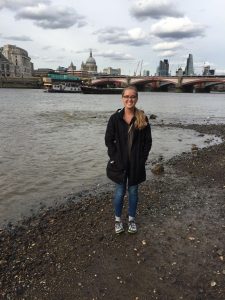
While many undergraduate History majors have the opportunity to mine archival collections in Wilson Library, a few lucky students are able to travel the world for research during their time at UNC. Thanks to the Summer Undergraduate Research Fellowship (SURF) offered by the Office for Undergraduate Research in the College of Arts and Sciences, students like Lacey Hunter can pursue projects that take them beyond the collections available on campus.
Hunter, a senior double majoring in History and Archaeology, applied for SURF funding during her junior year after deciding that she wanted to write an honors thesis. Hunter was one of only 60 undergraduate students in the College of Arts and Sciences awarded a SURF. History majors Henry Hannapel, Christopher LaMack, Alexander Peeples, and Jack Walsh also received SURF grants in 2017.
Hunter used her SURF funding to visit archives in Washington, DC and London, where she examined primary sources for her thesis, tentatively titled “Where to Draw the Line for Liberty: Perspectives on African-American Freedom Following the American Revolution.”
“I look at this individual, [British Major-General] Sir Guy Carleton, and I look at his life and how his life reflected or did not reflect greater trends in the British administration and British military,” Hunter explained. “As the empire is expanding, they’re controlling more foreign peoples, and [I ask] how they dealt with that and how they viewed people who were very different from them, in their minds.”
Hunter was inspired to pursue this intellectual history in Kathleen DuVal’s class, “Revolution and Nation-Making in America, 1763-1815.” DuVal asked students to read historian Cassandra Pybus’ Epic Journeys of Freedom, which discusses Guy Carleton and George Washington’s negotiations over the futures of African-Americans who had fought for the British, who had promised them freedom in exchange for joining the Loyalist cause.
“I thought that was so interesting, and it was very new to me, and that basically is what inspired my idea. I have obviously taken a different approach than [the author] did, because she follows the individuals that were affected by these higher-up decisions, and I’m looking at those higher-up decisions and where those decisions and ideas came from,” Hunter said. Her thesis adviser is Wayne Lee, who has helped her understand “military details and how the eighteenth-century British military functioned,” she said.
While Hunter’s SURF took her across the Atlantic Ocean, other History majors used their funding to perform research here on campus. Henry Hannapel, a junior majoring in History and Economics, wanted to understand how student veterans transition to civilian life at UNC.
“I look into how student veterans at UNC are transitioning, what their experiences are like, and learn from them so we can better tailor our university to meet what they need,” Hannapel explained. While he initially considered using existing oral histories for his project, Hannapel ultimately decided to do his own interviews with veterans currently enrolled at UNC.
Eventually Hannapel, who is working closely with the Carolina Veterans Association, wants to create an online resource for veteran and non-veteran students at UNC. He envisions this website as “an informative place where people can go to learn about student veterans, the military, and military culture.”
Hannapel is working under the direction of a faculty adviser in the Department of English, but he still sees his training in History as essential to his project. “Something I’ve gained from my pursuit of a History degree is learning how to approach problems in a different way than maybe someone with a Biology degree or a Mathematics degree,” Hannapel said. His History courses helped him understand the complex contexts that shape an individual’s worldview. “I really wanted to get to know the student veterans that I was interviewing, but also I wanted to try to understand how they saw civilian students and how civilian students saw them, how that’s different, and how we can work together to attack that issue and try to solve it.”
Aubrey Lauersdorf
